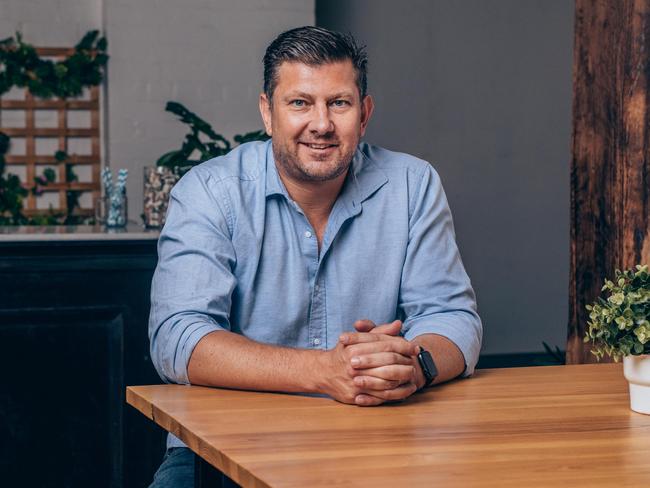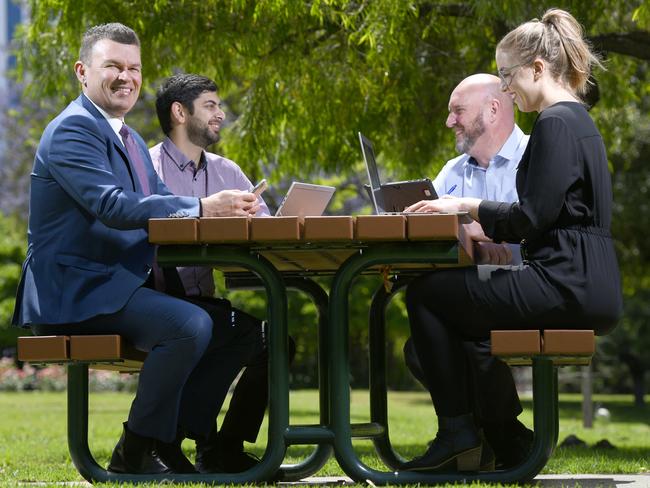How strong leaders are leveraging COVID-19 to improve workplace culture
The pandemic has either encouraged workplaces to come together stronger than ever or forced staff toward burn out. Leaders share tips for ensuring your team is on the right track.
Careers
Don't miss out on the headlines from Careers. Followed categories will be added to My News.
THE COVID-19 outbreak has had a huge effect on company culture but whether it is positive or negative often comes down to the company’s leadership.
An Australian HR Institute report finds just 27 per cent of respondents at organisations where culture has been adversely affected by the pandemic consider their leadership to be “energising”. Just 60 per cent say their leaders are “empathetic and caring”.
It compares to 74 per cent and 93 per cent, respectively, in organisations where culture has not been adversely affected by the pandemic.

People management platform Employment Hero co-founder and chief executive Ben Thompson said the COVID-19 crisis revealed cultural gaps and inconsistencies in many organisations.
“Those without a healthy workplace culture, and an unwillingness to create one, have struggled with employee burnout which ultimately leads to low productivity and absenteeism,” he said.
“We are experiencing a remote work revolution (so) now is the opportunity to reshape a standard of workplace culture centred on equitable practices; giving people the freedom, trust and rights to work wherever and however they do their best work without sacrificing productivity or quality.
“Complacency will not fly in a post-COVID world.
“Leaders that refuse to see the value of an inclusive, flexible and equitable workplace culture will find themselves losing top talent to businesses that do.”
Thompson said leaders with hybrid teams needed to make a conscious effort to be inclusive of both remote and office staff.
“Leaders need to implement rules that level the playing field between all employees, no matter where they are located,” he said.
“At Employment Hero, we have a rule that if one person has to dial into a meeting, then everyone has to – even if nine people are in the office and one is working from home.
“We’ve also started setting clear agendas and recording meetings so that everyone can follow along in different time zones if need be.”

Insurance company Gallagher Basset international executive vice president Jon Winsbury said strong workplace culture had never been more important to businesses.
“There are a number of new cultural challenges businesses are grappling with, especially with people not being able to meet in person to reinforce and solidify their shared culture,” he said.
“With changes in the workplace coupled with the stresses in peoples’ personal lives, it’s no wonder culture is front of mind for many leaders.”
September research from Roy Morgan that surveyed more than 4000 working Australians revealed the extent to which workers had been disrupted by the pandemic.
It found 27 per cent had begun working from home, 20 per cent had their work hours reduced, 14 per cent had their work hours increased, 10 per cent were stood down for a period of time, and 6 per cent had their pay reduced while working the same hours.
Winsbury said it was important for leaders to “embed a culture of adaptability”, where teams were wired to quickly problem solve and innovate.
“(You want) a culture that thrives when it responds to emerging challenges and excels at identifying and taking advantage of new opportunities,” he said.
“As leaders, we need to nurture a culture that supports our people staying focused on the most important priorities, even as we contend with the continuously changing conditions presented by the pandemic.”

Credit Union SA chief executive Todd Roberts believed his organisation had become more progressive, flexible and responsive since the pandemic.
He said the leadership team worked hard to demonstrate a culture of connection and support and shared some practical ways for leaders for improve their own workplace cultures:
LISTEN
“The mood in an organisation can change quickly, almost daily, depending on internal and external events,” he said.
“Maintaining awareness by listening to team members’ feedback and observing body language is vital.”
COMMUNICATE
“Timely and frequent, bite-size communication that ensures everyone is on the same page can help maintain connection and inclusion,” he said.
EMPOWER
“Leaders can’t do it all and delegating responsibility demonstrates high trust, builds efficacy in people and strengthens an inclusive mindset,” he said.
CARE AND SUPPORT
“When things are uncertain, the importance of being there for your people is amplified so leaders really need to lean towards a focus on their people,” he said.
“Yes, achievement of goals and solving problems is vital but it will only be possible if
people feel safe and valued.”
More Coverage
Originally published as How strong leaders are leveraging COVID-19 to improve workplace culture




